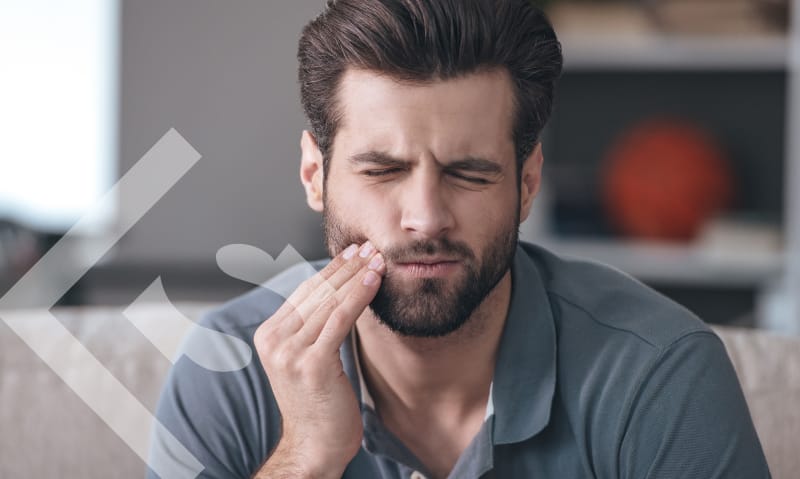5 Signs and Causes of Sensitive Teeth and What Helps Fix It

Why are my teeth so sensitive?
Many people experience tooth sensitivity at one time or another. Tooth pain can impact your quality of life, but there’s no reason to live with the discomfort. Check out these 5 common signs of sensitive teeth, common causes, and what you can do to address the issue.
1. Pain While Chewing
Have you ever felt a sudden twinge of pain when biting down? Unless that pain is from a tooth suddenly cracking or chipping, chances are you’re dealing with tooth sensitivity.
When a chewing surface with thin enamel or an open cavity receives physical pressure, you’ll feel a sharp pain. Many people simply try to avoid chewing in that spot, but the real solution is to bring it up with your dentist.
2. Sensitivity to Cold Air
Your teeth contain nerves that detect hot and cold temperatures. Those nerves are in the center of the tooth, insulated by dentin and enamel. But as the enamel wears down, heat transfers more easily into and out of the tooth.
Patients with sensitive teeth may especially notice pain when inhaling cold air. This can be a real issue once winter comes around, as each breath can cause a quick, sharp pain.
3. Reaction to Hot or Cold Foods
The same issue that causes sensitivity to cold air applies to hot or cold foods and drinks as well. This means that even the mild temperature of a cold glass of water can cause pain that you might feel in freezing climates.
Hot foods can be just as much of an issue. This makes having a morning coffee particularly difficult because it is hot, acidic, and often sugary—a triple threat for sensitive teeth.
4. Transitory Tooth Pain
While chronic throbbing is a common sign of an infection, sharp and inconsistent pain (or discomfort brought on by certain triggers) is more reflective of tooth sensitivity. However, a physical injury to your tooth or jaw can also cause sudden, sharp pain.
5. Sensitivity to Acidic or Sweet Foods
Acidity and sugar can both exacerbate sensitive teeth. This is particularly true for an open cavity, where these two triggers accelerate the decay. Acidity wears down enamel, and sugar provides more food for bacteria to grow in the recesses.
What’s making my teeth sensitive?
Many factors contribute to sensitive teeth. In general, sensitive teeth are caused by enamel wear, which exposes the sensitive layers underneath.
One way you can lose enamel is through the progression of tooth decay. Bacteria in your mouth produce acid that eats away at the enamel, creating cavities that can be incredibly sensitive.
Enamel can also wear away due to physical abrasion. For example, brushing too hard can wear down enamel over time, leading to sensitivity. You may accelerate this process if you use a hard-bristled toothbrush or an abrasive toothpaste, such as one that contains charcoal.
Many people don’t realize they grind their teeth while they sleep. Stress in your life, along with other factors, can lead you to grind your teeth. This can cause jaw pain and TMJ disorders, along with slowly wearing down the chewing surfaces of your teeth.
Another extremely common cause of tooth sensitivity is gum recession. Recession exposes the root surfaces of teeth, where there is no enamel, so these areas are naturally more sensitive.
What You Can Do About It
If you’re experiencing sensitive teeth or tooth pain, the time to act is now. While remineralization heals enamel during the first stage of tooth decay, enamel can’t be recovered once lost. Letting issues continue could mean needing a dental crown or other restoration if too much enamel is lost.
See your dentist to find out what’s causing your tooth sensitivity. They may recommend treatment options for underlying issues, such as a filling for a cavity or a nightguard to prevent grinding. These custom mouth guards protect your teeth and help to resolve both enamel wear and jaw pain.
Your dentist can also provide oral hygiene tips to combat sensitivity, such as toothpaste for sensitive teeth. Your brushing technique is another key area to look at; your dentist or hygienist can help you perfect it, but all dental professionals agree: Only use a soft-bristled brush.
See your Newport Beach dentist about sensitive teeth.
If you’ve been experiencing symptoms of sensitive teeth or other types of tooth pain, the best thing to do is reach out to Luminous Smiles. We are your preferred dental team in Newport Beach for all of your dental needs. We’ll find out what’s wrong and form a treatment plan to help you get rid of tooth sensitivity for good. Contact our office today to get started.